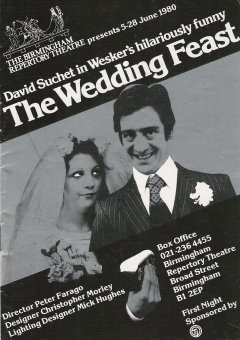 The Wedding Feast
The Wedding Feast
by Arnold Wesker
Opened at The Birmingham Repertory Theatre June 1980
Running time: ?
2 x 15 min intermission
Director: Peter Farago
Design: Christopher Morley
Lighting: Mick Hughes
Synopsis Notes
Run Sheet
Birmingham Repertory Theatre........... 5 - 28 Jun 1980
Cast
David Suchet..... Louis Litvanov, shoe manufacturer
Susan Brown..... Kate White, Louis’ secretary
David Lyon..... David Lowery, Louis’ manager
Joseph Greig..... Mr. Hammond / Mr. Dawson, managing director of chain of
shops / the bride’s father, shoe operative
Ian MacKenzie..... Knocker White, the groom and Kate’s brother, shoe operative
Bill Cullum..... Tosh White, Kate and Knocker’s uncle, shoe operative
Pat Keen..... Emily White, Tosh’s wife
Chris Fairbank..... Tinker White, Emily and Tosh’s son, regular in the army
Nichola McAuliffe..... Daphne Dawson, Knocker’s bride, shoe operative
Maryann Turner..... Mrs Dawson, the bride’s mother
Cliona Nunan..... Maureen Dawson, the bride’s sister, shoe operative
David Bradford..... Martin Dawson, the bride’s brother, building worker
Philip Croskin..... Ringo Ray, Martin’s friend, shoe operative
Patrick Malahide..... Stephen Bullock, Kate’s friend, journalist
Roger Hume..... Bonky Harris, shoe operative
Synopsis
The synopsis is mainly based on reading the Penguin Plays paperback edition “Shylock and other plays” from 1990, featuring The Wedding Feast in a cut and revised version from that of the Birmingham production, which means some issues could differ...
The play is set in 1970’s Norwich in Norfolk, England.
Louis Litvanov is an idealistic, Jewish ex-Marxist of Russian origin with a long line of peasants and cobblers. He came to England as a child with his impoverished parents, worked his way up and has now become a successful shoe manufacturer with a strong concern for justice and ideas of equality between employer and employee. He is (unhappily) married, has two sons, an expanding factory, two country mansions, a London flat, a Rolls (for weekend visiting only), a - modest - Ford for daily use and a chauffeur.
He has an urge for his workers to look up to him, to se him as a firm, but kind, generous and caring employer. Love, trust and care for your workers and they will love and trust you, is his belief. He treats them in agreement with that; gives them bonuses as soon as the factory makes a profit, sets up a company football team to benefit socialization, pays sick pay as the only company in the industry... When it seems that the workers exploit Louis' good will - among other things illness increases - he understands and sympathizes with them, they merely do what he did once being in their situation. It's a hard, monotonous job and you just have to compensate for it by grabbing all the recreation you can get. When the factory replaces old three-men-operable machines with new one-man-operable, he even understands and accepts when his workers insist on still working three at each machine 'for historical reasons’...
One day Louis happens to pass by Knocker’s house. Knocker is one of his workers, and he is having a wedding party, colleagues, friends and family being among the guests. Louis decides to pay a brief, unexpected visit, just to wish bride and groom well. By doing so he believes it will show that he sees them as equals and cares about them, and he is convinced that his gesture will make everyone respect and admire him. After a rather awkward entrance involving an encounter with a large blancmange and some embarrassment, he is greeted and persuaded to stay. As the hours go by he slowly gets drunk with the rest of the party, and things don’t turn out the way he had planned. Not all treat him with the respect he thinks he deserves, and not all feel comfortable about having him around. When he becomes a target in a party game (involving a whole bunch of shoes), it seems his ideas on equality might take a turn...
Notes
The Wedding Feast is freely adapted from the Dostoyevsky story A Nasty Incident... or An Unpleasant Predicament... or... actually the story has several English titles besides the two, like A Nasty Tale, A Disgraceful Affair, A Silly Anecdote...The Russians call it Skvemyi Anekdot, and Dostoyevsky wrote it in 1861-62. The play was originally a film script called The Master (a 'nickname' used within the shoe industry for the employer) commissioned by producer Mark Robson and Hollywood actor Anthony Quinn. When the script was completed in November 1966, the two turned it down - in Wesker’s opinion because they felt there wasn’t enough sex in it. He retained the rights to do a stage play of it, put it down for six years and then began to rewrite it in 1972. Two years later, in May 1974, it had its world premiere on Stadtsteater in Stockholm. When brought to Leeds Playhouse in a 1977 production, the play attracted the best reviews Wesker had had since another of his plays, Chips with Everything, according to his own statement.
NB! If you have any reviews or newspaper cuts on the Birmingham Production that you would care to share, please e-mail me
In rehearsal - Patrick Malahide and David Suchet
David Suchet, Susan Brown, Roger Hume Back: Philip Croskin, Cliona Nunan
Front: Maryann Taylor, Joseph Greig
David Suchet
January 2008 © All rights reserved
Last updated February 2008
top